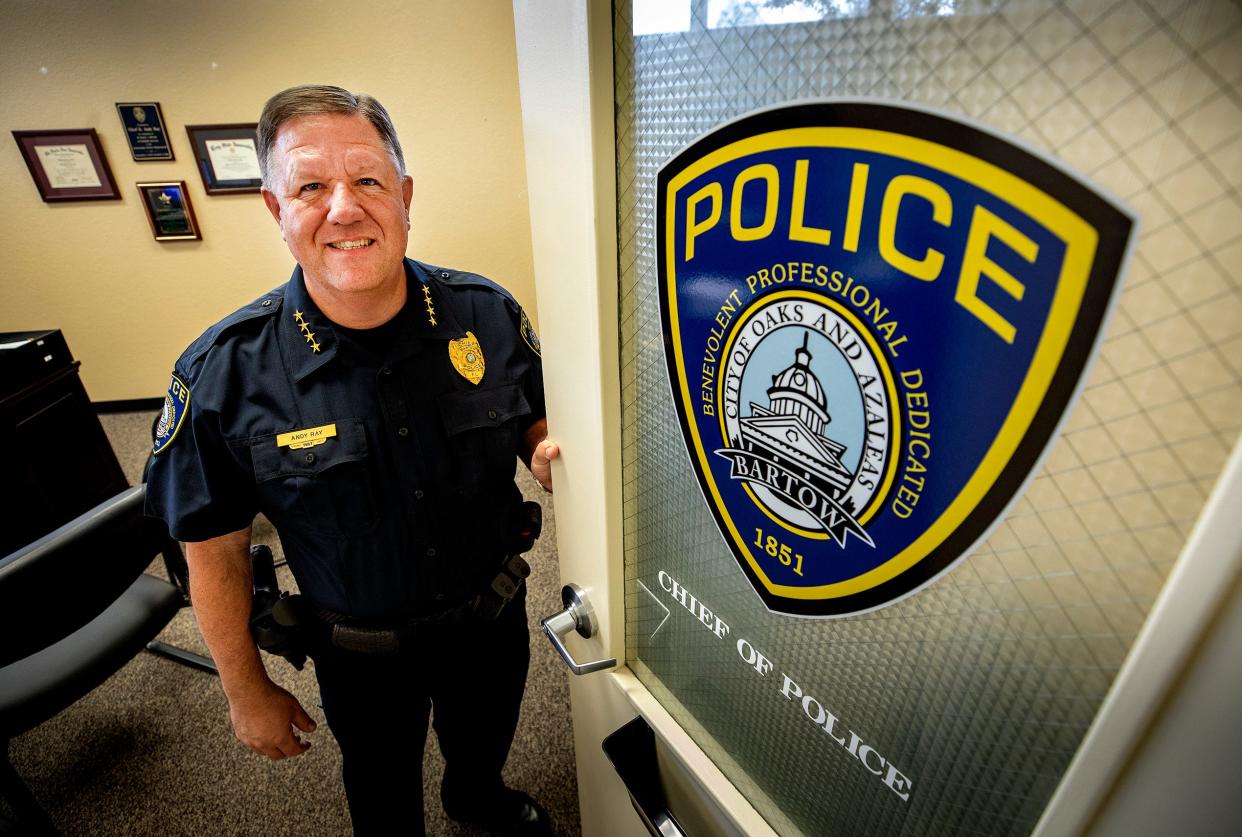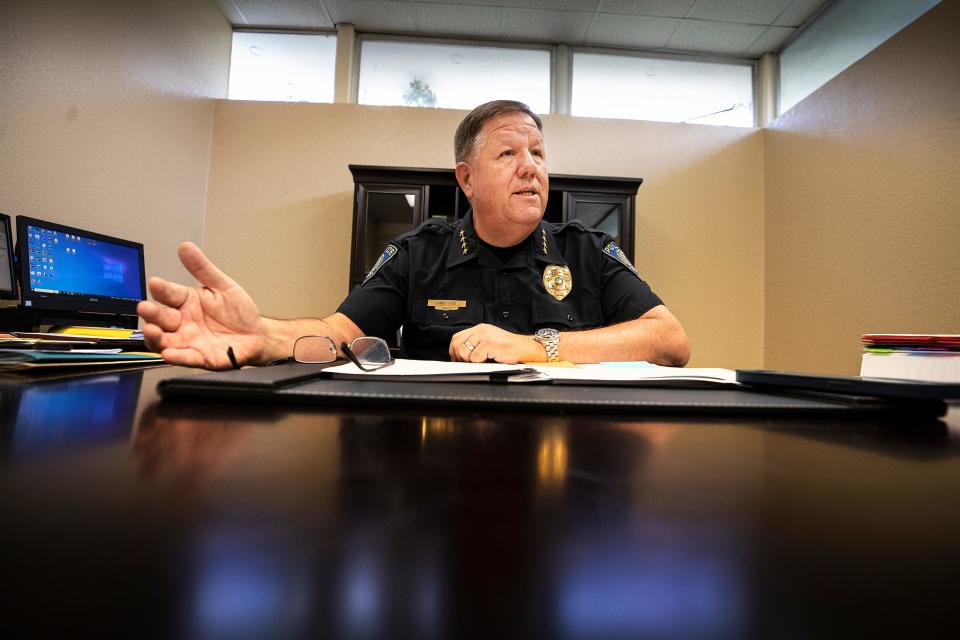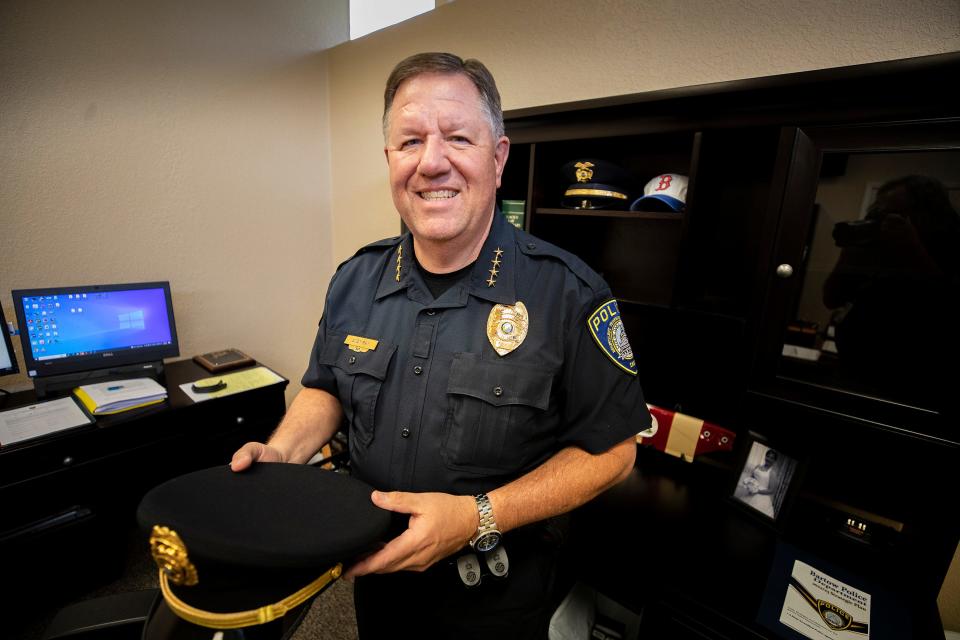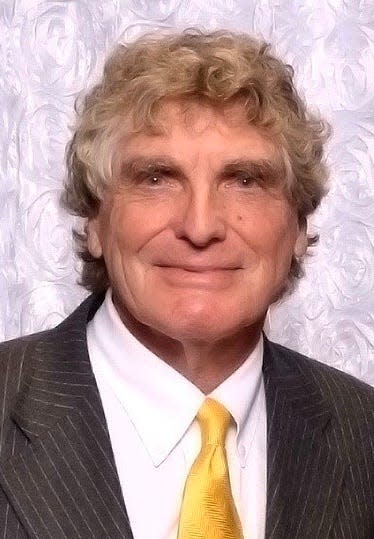'Change people's lives': Bartow Police Chief Andy Ray talks about fixing the department

Sheriff Grady Judd, who has known and worked with him for many years, says newly appointed Bartow Police Chief Keith A. “Andy” Ray “will take the Bartow Police Department to the next level.”
In Bartow’s case, the “next level” is something many would regard as pretty basic – being able to summon enough competence and credibility to have major cases they’ve investigated accepted for prosecution by the State Attorney’s Office, which has heretofore refused to use their detectives’ work for murders, sex offenses and child abuse crimes on grounds the department’s abilities are woefully inadequate.
That’s a harsh professional judgment but it’s shared by others.
In reporting his findings, a consultant commissioned by City Manager Mike Herr to evaluate Bartow’s police agency used terms like “turmoil … crisis in leadership … visible discord … rapidly declining morale … poor communication … division … low levels of trust” – land mines awaiting the new leadership. Teh consultant topped it off by mentioning there existed “an overwhelming lack of respect” for the new chief’s immediate predecessor. The report also faulted the department’s training and equipment.
Undertrained officers, out-of-date gear, communication issues, morale problems and poor leadership – what’s left?
Into this morass steps Ray, whose 36 years in law enforcement includes a couple of decades of ever-increasing responsibilities with the Sheriff’s Office, service as deputy chief and then chief of police in Auburndale and recent employment with the State Attorney’s Office. He comes with high hopes and fulsome praise from those who have worked with him.
State Attorney Brian Haas, a Bartow native, notes that “the safety of our community is impacted,” and says he is confident the 58-year-old Ray “is going to get them on the right track,” praising the new chief’s leadership qualities, background and training.
“It’s going to take some time, but I’m all in for working with him and the officers to do everything we can to make that the best police department it can be,” Haas said.
Ray’s first day on the job was Aug. 7.
Q. Based on your previous stints at different law enforcement agencies, on a scale of 1 through 10, with 10 being the best prepared, best equipped, best trained and best led, where does the Bartow police department stand now?
A. Overall, I’d say we’re probably around a seven.
Q. That seems rather at odds with the consultant’s findings.
A. When you have an agency the size of ours, which is 47 sworn and 72 total, our detectives have to be generalists – they have to be prepared for everything. So our first focus is getting them trained.
We have four detectives who handle all kinds of cases, another one who does narcotics. I’m looking at what needs to be done to make them ready to go on those more serious cases. That means sending them off for additional training as well as working with larger agencies like the Sheriff's Office to do some of the investigations, homicides, child sex crimes, child abuse. I’m confident we will soon have the ability to investigate those cases.
Armed man Bartow officers fatally shoot man who carjacked vehicle, pointed gun at them, police say
Q. How do you fundamentally change the culture of any institution without resorting to wholesale replacement of personnel?
A. In my experience, one of the most important pieces to the success of an organization is good leadership – leadership that people trust. I have tried over my career to build a reputation for treating people fairly, for supporting them all the time, for encouraging an atmosphere where people want to come to work because they enjoy it and we support each other. So a big part of culture is the atmosphere.
For me – and I learned this from my dad – your ability to create relationships with people is super important and to talk to people on a level that we share. A little pat on the back goes a long way. You have to recognize them when they do good work, and there might not have been a lot of that happening here.
I want to work on getting us all pointed in the right direction so that we work as a team. People tend to get comfortable in their silos, and we want to avoid that, to make sure patrol and detectives and communications are all working together.
Q. What metrics have you developed or will you develop in evaluating progress toward the goal of having a first-rate police department that Bartow’s citizens can be proud of?
A. One of the things they were already doing was tracking feedback from the State Attorney’s Office – what we filed, which were no-billed, why they were no-billed, what could be done to correct that. We’ll continue to use that metric – the success of the filing rate.
Another thing to look at is “use of protective action,” which in plain talk is use of force. One of the things I always talk about is the misperception that police use force often – because it hardly ever happens.
In Auburndale, 1% of the arrests involved the use of some sort of force, or protective action – if you fired a gun at somebody, hit them with a baton, popped them with a taser, sprayed them with pepper spray, or if your physical efforts to control them resulted in an injury.
In 2014 in Auburndale, we arrested 800 people and never used force one time. That’s an important metric – how we’re dealing with people, how is our ability to de-escalate conflict, how to avoid using protective action – if it can be avoided.

Q. Given that both the current and former state attorney have not accepted major crime investigations from Bartow police for some years now – a major blemish to standards of professionalism – how is possible that the department has retained certification from the Commission for Florida Law Enforcement Accreditation?
A. They also operate on metrics. They look at all your systems and all your policies and procedures and measure you against about 280 specific standards. When they’re on site, they look at your facilities, the equipment in officers’ cars, making sure officers are qualified for the weapons they are carrying, what training is taking place.
How you document your investigations is a standard, but if you’re not doing those types of investigations and the Sheriff’s Office is, then you get a free pass on that.
Q. Untreated mental illness is one of the more obvious societal problems that law enforcement must deal with on a daily basis. What is Bartow’s situation and how are your officers trained to deal with such issues?
A. There’s a 40-hour course called crisis intervention training. The great majority of our people have been through that course and the rest will.
It gives you a bit better ability to comprehend what mentally ill people are experiencing and how to maybe talk through those issues. It teaches a lot of different ways to deal with mental illness and mental crises.
Lately there’s at least one or two Baker Acts every day in Bartow. We try to triage them and get them to a crisis stabilization unit so that they can at least get stabilized and hopefully have a better chance of getting treated.
Q. Many smaller police departments face similar issues of officer retention because of non-competitive salaries compared to larger agencies such as the Sheriff’s Office. What inducements can a city like Bartow offer to keep trained personnel in light of that reality?
A. People aren’t going to leave the job they have now for a small increase in salary if they’re happy where they are and if they feel valued and if they’re being treated well. People generally won’t leave one agency and go to another for two or three thousand dollars.
But we do need to make up the salary differential if possible because it is hard to attract people and we need to be competitive locally. The Polk County Sheriff’s Office starting pay is about $56,000. You can go to Hillsborough County where their starting pay is close to $70,000, while ours right now is about $46,000. So it’s so important to pay a competitive wage.
'This is my heart and soul' Sheriff Grady Judd reflects on changes over the past 50 years
Q. Shifting gears, it’s fair to say that not everyone is cut out to be a police officer with so many demands made of law enforcement personnel these days. There's upholding the law, doing investigations and making arrests, of course – but also duties requiring police officers in day-to-day interactions with the public to act as psychologist, mediator, crisis defuser, family counselor and other non-traditional roles. Given all the challenges, what attributes make up the ideal police officer?
A. The ideal officer, number one, is a great communicator or at least has the ability to learn that art, as well as the ability to have a level head and to be calm even when things are swirling around them.
You have to have an interest in people, be concerned about them, to want to make a difference in the community. You have to have an inquisitive mind that makes you want to know more. A formal education is important. It teaches you how to research things but also makes you want to know more because the more you know the more you’re able to do.
You also have to have the instinct to run toward danger when everyone else is running away. That requires courage. There are many days when things are mundane, but that can change in the snap of a finger and your mundane call just went to something life-threatening. You have to be able to deal with that.
So you have to have a genuine concern for your fellow man but at the same time to know that in a split second your life can change and you may have to use deadly force against someone. And you have to be willing to do it – you can’t think about it because you’re going to get yourself killed or get your partner killed or get some innocent civilian killed if you don’t do what you have to do when things get bad.

That said, I’ve never met a police officer who was looking for the opportunity to hurt or kill somebody but if they were and I was the boss, they’d be out the door.
This job is complicated. You have to have a brain that works in a way that helps you solve complex problems, sometimes in just a few seconds. If you don’t have that ability and if you don’t know in your mind that you can do violence if you must, then this job is not for you. Knock on wood, I’ve been fortunate to be 36 years in this profession and never had to shoot anybody.
Q. Why did you choose law enforcement as a career?
A. Growing up, police officers seemed to be a great help to people. In my 6-year-old mind, everyone looked up to them and I was just fascinated by the excitement and the ability for me to do something that actually leaves a mark on the community in a good way.

I feel like I’ve done that. It’s very easy for our people to lose sight of the fact that they’re helping people every day because nobody calls you when things are good.
So you’re always going to a place with a problem and sometimes it’s a significant problem and sometimes it involves a hurt child or one of those things that sticks with you forever. But the biggest thing for me was I could do a job that was interesting every day, different every day and I had the ability to maybe change people’s lives for the better.
This article originally appeared on The Ledger: New Bartow Police Chief Andy Ray talks about changing the department

